Hospitality Business in Global Context: Sustainability Essay
VerifiedAdded on 2022/10/06
|7
|1615
|20
Essay
AI Summary
This essay examines the impact of sustainability practices and related jurisdiction changes, specifically Australian business and environmental laws, on the hotel industry. The introduction establishes the social-political context, emphasizing the importance of environmental protection and sustainable development. The body of the essay analyzes significant cases, such as Accor and Marriot's initiatives, to illustrate the implementation of sustainability measures, including waste management, energy conservation, and eco-friendly practices. The essay then discusses the impact of these changes, particularly the POEO Act, on the hotel industry, detailing environmental protection policies, licensing procedures, and offenses with associated penalties. The conclusion assesses the benefits of these changes for various stakeholders, including consumers, employees, and property owners, highlighting the role of sustainable practices in improving hotel performance. The essay incorporates references to support its analysis.

Hospitality business in the Global context
Paraphrase This Document
Need a fresh take? Get an instant paraphrase of this document with our AI Paraphraser
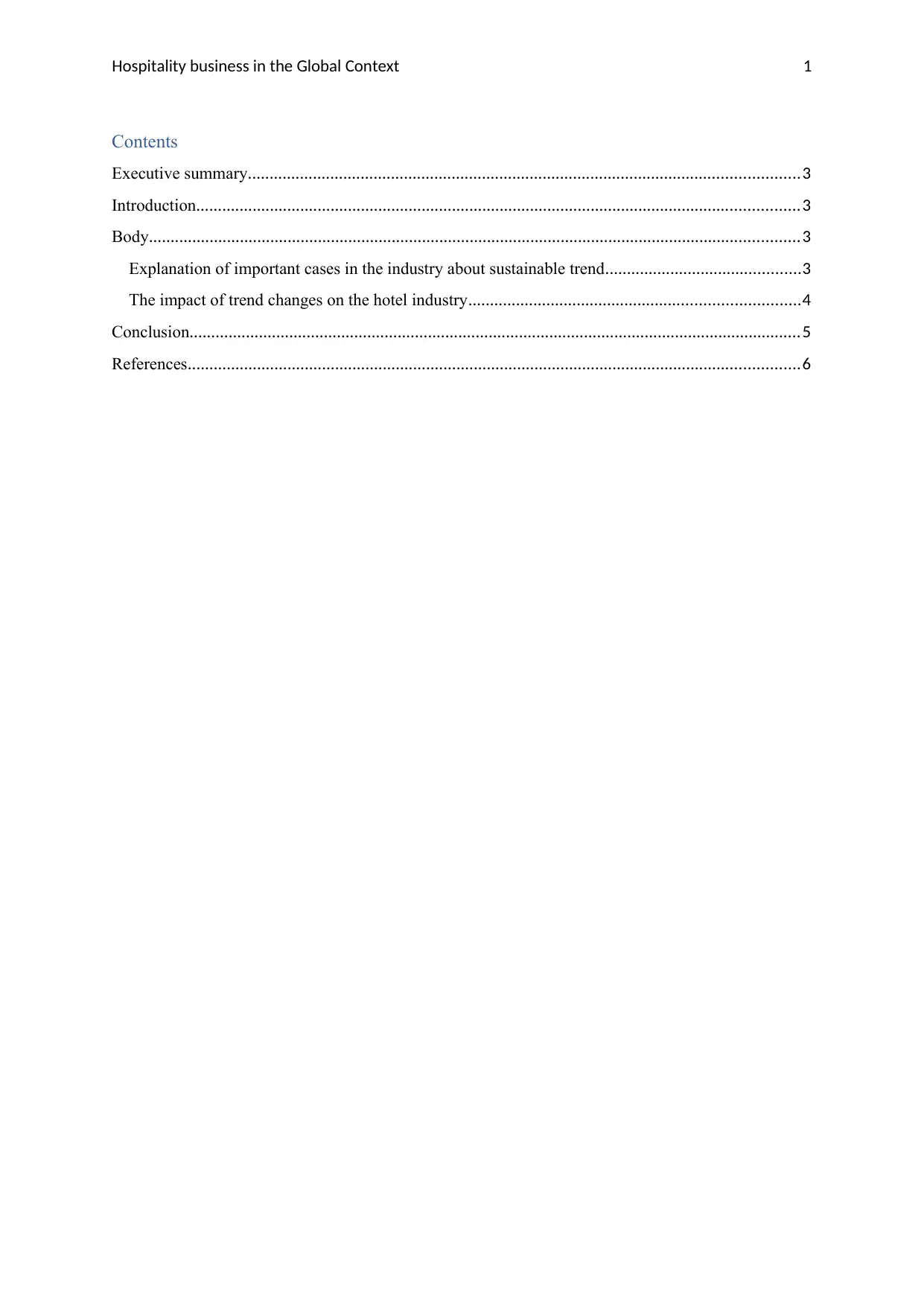
Hospitality business in the Global Context 1
Contents
Executive summary...............................................................................................................................3
Introduction...........................................................................................................................................3
Body......................................................................................................................................................3
Explanation of important cases in the industry about sustainable trend.............................................3
The impact of trend changes on the hotel industry............................................................................4
Conclusion.............................................................................................................................................5
References.............................................................................................................................................6
Contents
Executive summary...............................................................................................................................3
Introduction...........................................................................................................................................3
Body......................................................................................................................................................3
Explanation of important cases in the industry about sustainable trend.............................................3
The impact of trend changes on the hotel industry............................................................................4
Conclusion.............................................................................................................................................5
References.............................................................................................................................................6
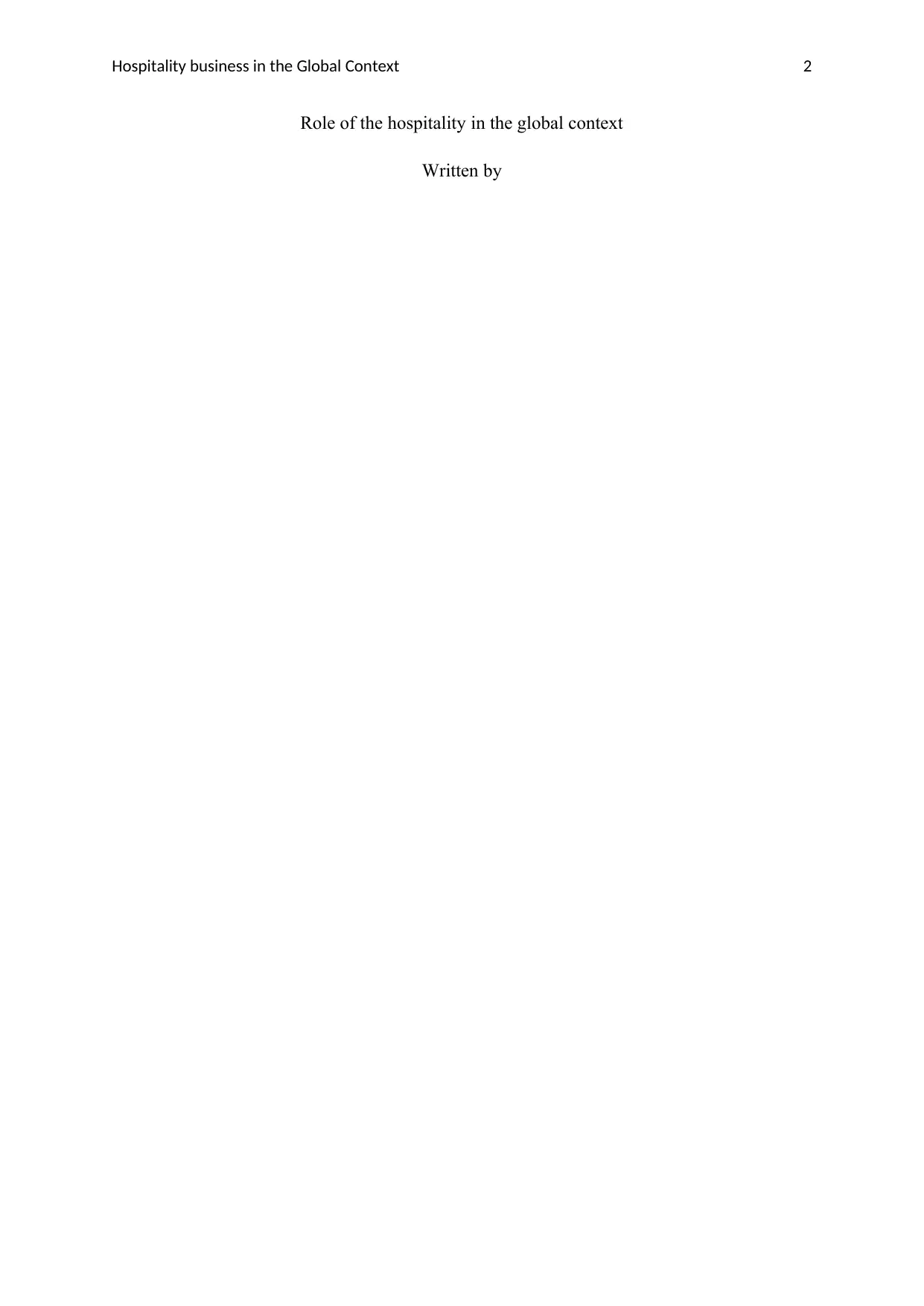
Hospitality business in the Global Context 2
Role of the hospitality in the global context
Written by
Role of the hospitality in the global context
Written by
⊘ This is a preview!⊘
Do you want full access?
Subscribe today to unlock all pages.

Trusted by 1+ million students worldwide
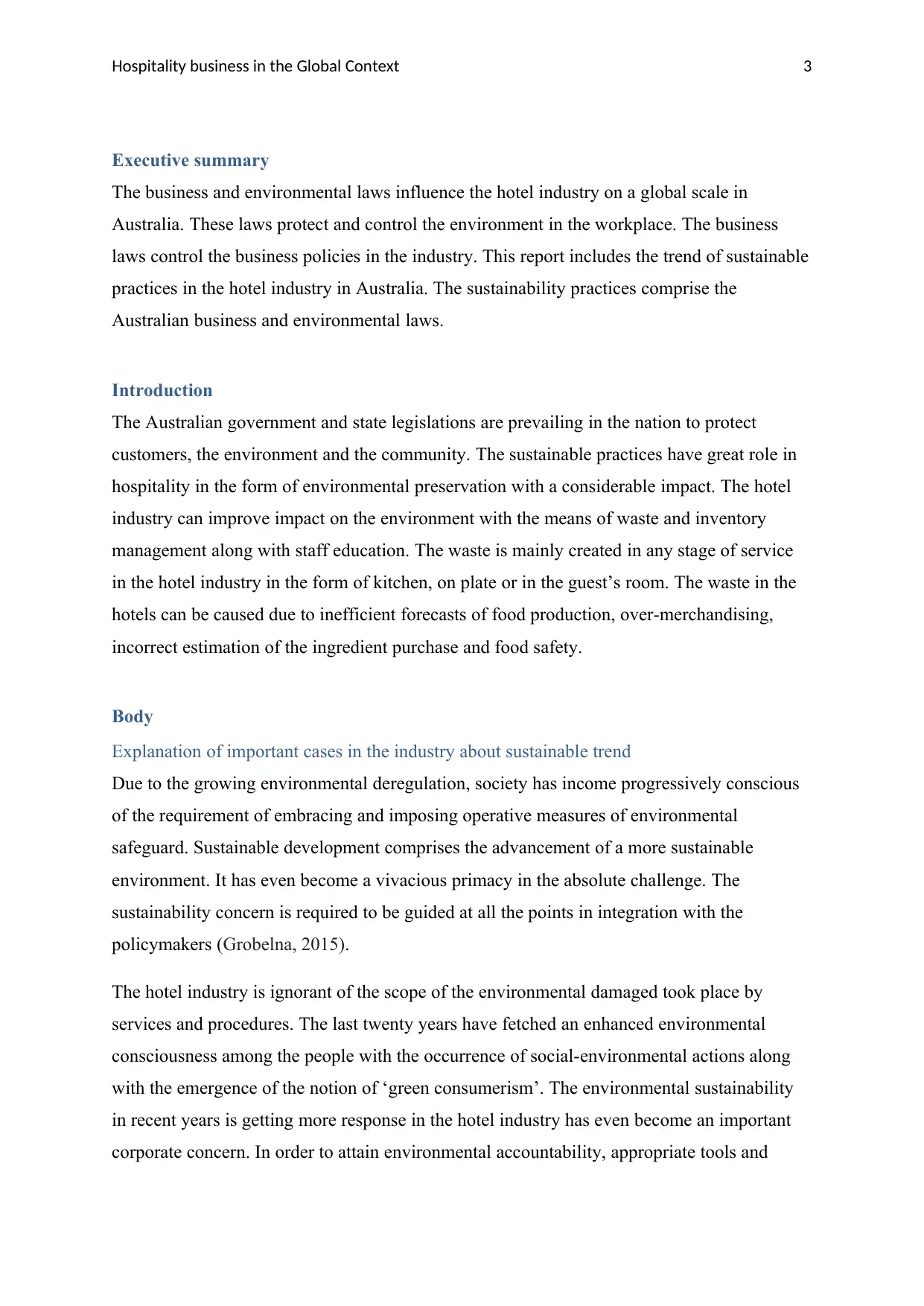
Hospitality business in the Global Context 3
Executive summary
The business and environmental laws influence the hotel industry on a global scale in
Australia. These laws protect and control the environment in the workplace. The business
laws control the business policies in the industry. This report includes the trend of sustainable
practices in the hotel industry in Australia. The sustainability practices comprise the
Australian business and environmental laws.
Introduction
The Australian government and state legislations are prevailing in the nation to protect
customers, the environment and the community. The sustainable practices have great role in
hospitality in the form of environmental preservation with a considerable impact. The hotel
industry can improve impact on the environment with the means of waste and inventory
management along with staff education. The waste is mainly created in any stage of service
in the hotel industry in the form of kitchen, on plate or in the guest’s room. The waste in the
hotels can be caused due to inefficient forecasts of food production, over-merchandising,
incorrect estimation of the ingredient purchase and food safety.
Body
Explanation of important cases in the industry about sustainable trend
Due to the growing environmental deregulation, society has income progressively conscious
of the requirement of embracing and imposing operative measures of environmental
safeguard. Sustainable development comprises the advancement of a more sustainable
environment. It has even become a vivacious primacy in the absolute challenge. The
sustainability concern is required to be guided at all the points in integration with the
policymakers (Grobelna, 2015).
The hotel industry is ignorant of the scope of the environmental damaged took place by
services and procedures. The last twenty years have fetched an enhanced environmental
consciousness among the people with the occurrence of social-environmental actions along
with the emergence of the notion of ‘green consumerism’. The environmental sustainability
in recent years is getting more response in the hotel industry has even become an important
corporate concern. In order to attain environmental accountability, appropriate tools and
Executive summary
The business and environmental laws influence the hotel industry on a global scale in
Australia. These laws protect and control the environment in the workplace. The business
laws control the business policies in the industry. This report includes the trend of sustainable
practices in the hotel industry in Australia. The sustainability practices comprise the
Australian business and environmental laws.
Introduction
The Australian government and state legislations are prevailing in the nation to protect
customers, the environment and the community. The sustainable practices have great role in
hospitality in the form of environmental preservation with a considerable impact. The hotel
industry can improve impact on the environment with the means of waste and inventory
management along with staff education. The waste is mainly created in any stage of service
in the hotel industry in the form of kitchen, on plate or in the guest’s room. The waste in the
hotels can be caused due to inefficient forecasts of food production, over-merchandising,
incorrect estimation of the ingredient purchase and food safety.
Body
Explanation of important cases in the industry about sustainable trend
Due to the growing environmental deregulation, society has income progressively conscious
of the requirement of embracing and imposing operative measures of environmental
safeguard. Sustainable development comprises the advancement of a more sustainable
environment. It has even become a vivacious primacy in the absolute challenge. The
sustainability concern is required to be guided at all the points in integration with the
policymakers (Grobelna, 2015).
The hotel industry is ignorant of the scope of the environmental damaged took place by
services and procedures. The last twenty years have fetched an enhanced environmental
consciousness among the people with the occurrence of social-environmental actions along
with the emergence of the notion of ‘green consumerism’. The environmental sustainability
in recent years is getting more response in the hotel industry has even become an important
corporate concern. In order to attain environmental accountability, appropriate tools and
Paraphrase This Document
Need a fresh take? Get an instant paraphrase of this document with our AI Paraphraser
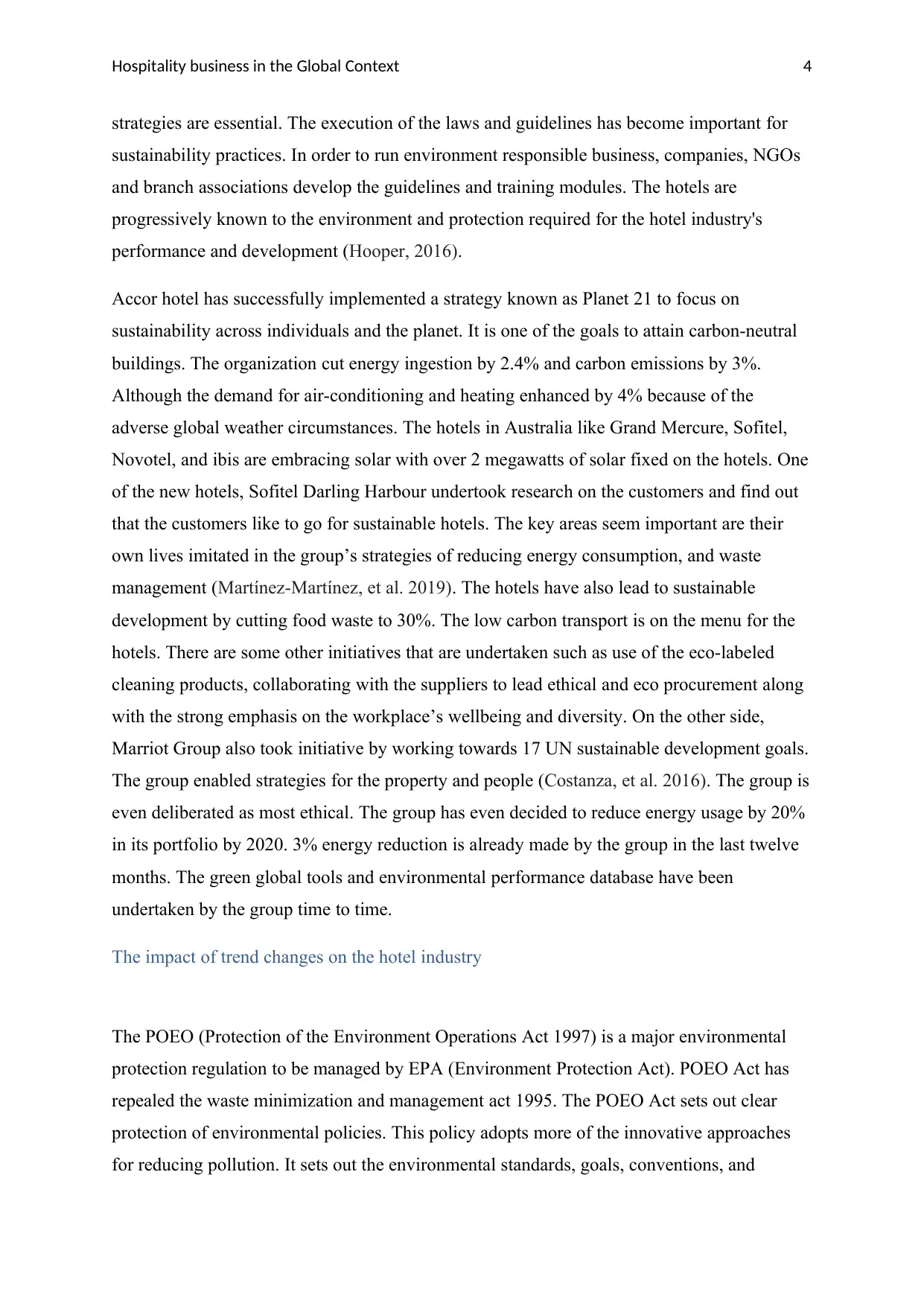
Hospitality business in the Global Context 4
strategies are essential. The execution of the laws and guidelines has become important for
sustainability practices. In order to run environment responsible business, companies, NGOs
and branch associations develop the guidelines and training modules. The hotels are
progressively known to the environment and protection required for the hotel industry's
performance and development (Hooper, 2016).
Accor hotel has successfully implemented a strategy known as Planet 21 to focus on
sustainability across individuals and the planet. It is one of the goals to attain carbon-neutral
buildings. The organization cut energy ingestion by 2.4% and carbon emissions by 3%.
Although the demand for air-conditioning and heating enhanced by 4% because of the
adverse global weather circumstances. The hotels in Australia like Grand Mercure, Sofitel,
Novotel, and ibis are embracing solar with over 2 megawatts of solar fixed on the hotels. One
of the new hotels, Sofitel Darling Harbour undertook research on the customers and find out
that the customers like to go for sustainable hotels. The key areas seem important are their
own lives imitated in the group’s strategies of reducing energy consumption, and waste
management (Martínez-Martínez, et al. 2019). The hotels have also lead to sustainable
development by cutting food waste to 30%. The low carbon transport is on the menu for the
hotels. There are some other initiatives that are undertaken such as use of the eco-labeled
cleaning products, collaborating with the suppliers to lead ethical and eco procurement along
with the strong emphasis on the workplace’s wellbeing and diversity. On the other side,
Marriot Group also took initiative by working towards 17 UN sustainable development goals.
The group enabled strategies for the property and people (Costanza, et al. 2016). The group is
even deliberated as most ethical. The group has even decided to reduce energy usage by 20%
in its portfolio by 2020. 3% energy reduction is already made by the group in the last twelve
months. The green global tools and environmental performance database have been
undertaken by the group time to time.
The impact of trend changes on the hotel industry
The POEO (Protection of the Environment Operations Act 1997) is a major environmental
protection regulation to be managed by EPA (Environment Protection Act). POEO Act has
repealed the waste minimization and management act 1995. The POEO Act sets out clear
protection of environmental policies. This policy adopts more of the innovative approaches
for reducing pollution. It sets out the environmental standards, goals, conventions, and
strategies are essential. The execution of the laws and guidelines has become important for
sustainability practices. In order to run environment responsible business, companies, NGOs
and branch associations develop the guidelines and training modules. The hotels are
progressively known to the environment and protection required for the hotel industry's
performance and development (Hooper, 2016).
Accor hotel has successfully implemented a strategy known as Planet 21 to focus on
sustainability across individuals and the planet. It is one of the goals to attain carbon-neutral
buildings. The organization cut energy ingestion by 2.4% and carbon emissions by 3%.
Although the demand for air-conditioning and heating enhanced by 4% because of the
adverse global weather circumstances. The hotels in Australia like Grand Mercure, Sofitel,
Novotel, and ibis are embracing solar with over 2 megawatts of solar fixed on the hotels. One
of the new hotels, Sofitel Darling Harbour undertook research on the customers and find out
that the customers like to go for sustainable hotels. The key areas seem important are their
own lives imitated in the group’s strategies of reducing energy consumption, and waste
management (Martínez-Martínez, et al. 2019). The hotels have also lead to sustainable
development by cutting food waste to 30%. The low carbon transport is on the menu for the
hotels. There are some other initiatives that are undertaken such as use of the eco-labeled
cleaning products, collaborating with the suppliers to lead ethical and eco procurement along
with the strong emphasis on the workplace’s wellbeing and diversity. On the other side,
Marriot Group also took initiative by working towards 17 UN sustainable development goals.
The group enabled strategies for the property and people (Costanza, et al. 2016). The group is
even deliberated as most ethical. The group has even decided to reduce energy usage by 20%
in its portfolio by 2020. 3% energy reduction is already made by the group in the last twelve
months. The green global tools and environmental performance database have been
undertaken by the group time to time.
The impact of trend changes on the hotel industry
The POEO (Protection of the Environment Operations Act 1997) is a major environmental
protection regulation to be managed by EPA (Environment Protection Act). POEO Act has
repealed the waste minimization and management act 1995. The POEO Act sets out clear
protection of environmental policies. This policy adopts more of the innovative approaches
for reducing pollution. It sets out the environmental standards, goals, conventions, and
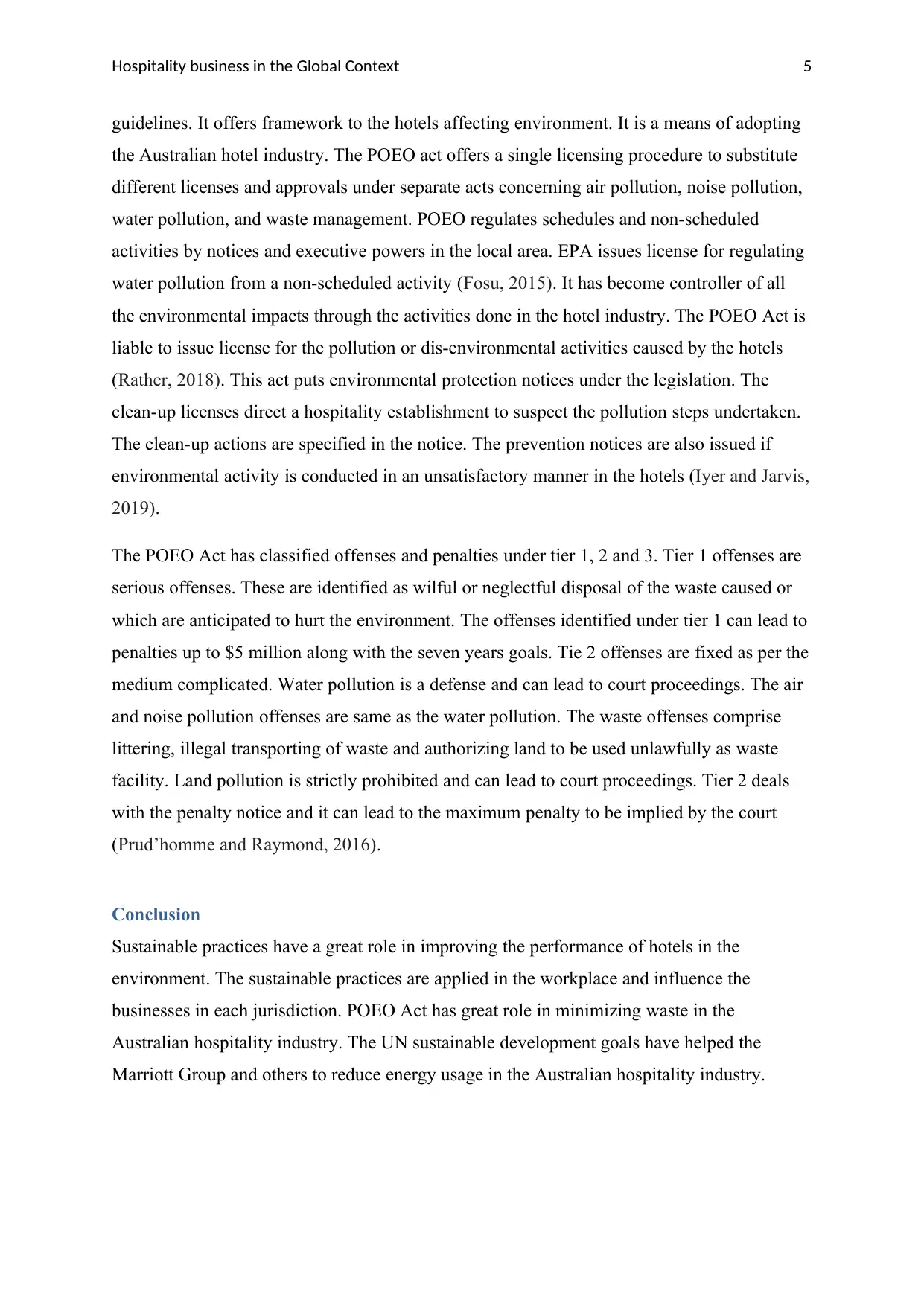
Hospitality business in the Global Context 5
guidelines. It offers framework to the hotels affecting environment. It is a means of adopting
the Australian hotel industry. The POEO act offers a single licensing procedure to substitute
different licenses and approvals under separate acts concerning air pollution, noise pollution,
water pollution, and waste management. POEO regulates schedules and non-scheduled
activities by notices and executive powers in the local area. EPA issues license for regulating
water pollution from a non-scheduled activity (Fosu, 2015). It has become controller of all
the environmental impacts through the activities done in the hotel industry. The POEO Act is
liable to issue license for the pollution or dis-environmental activities caused by the hotels
(Rather, 2018). This act puts environmental protection notices under the legislation. The
clean-up licenses direct a hospitality establishment to suspect the pollution steps undertaken.
The clean-up actions are specified in the notice. The prevention notices are also issued if
environmental activity is conducted in an unsatisfactory manner in the hotels (Iyer and Jarvis,
2019).
The POEO Act has classified offenses and penalties under tier 1, 2 and 3. Tier 1 offenses are
serious offenses. These are identified as wilful or neglectful disposal of the waste caused or
which are anticipated to hurt the environment. The offenses identified under tier 1 can lead to
penalties up to $5 million along with the seven years goals. Tie 2 offenses are fixed as per the
medium complicated. Water pollution is a defense and can lead to court proceedings. The air
and noise pollution offenses are same as the water pollution. The waste offenses comprise
littering, illegal transporting of waste and authorizing land to be used unlawfully as waste
facility. Land pollution is strictly prohibited and can lead to court proceedings. Tier 2 deals
with the penalty notice and it can lead to the maximum penalty to be implied by the court
(Prud’homme and Raymond, 2016).
Conclusion
Sustainable practices have a great role in improving the performance of hotels in the
environment. The sustainable practices are applied in the workplace and influence the
businesses in each jurisdiction. POEO Act has great role in minimizing waste in the
Australian hospitality industry. The UN sustainable development goals have helped the
Marriott Group and others to reduce energy usage in the Australian hospitality industry.
guidelines. It offers framework to the hotels affecting environment. It is a means of adopting
the Australian hotel industry. The POEO act offers a single licensing procedure to substitute
different licenses and approvals under separate acts concerning air pollution, noise pollution,
water pollution, and waste management. POEO regulates schedules and non-scheduled
activities by notices and executive powers in the local area. EPA issues license for regulating
water pollution from a non-scheduled activity (Fosu, 2015). It has become controller of all
the environmental impacts through the activities done in the hotel industry. The POEO Act is
liable to issue license for the pollution or dis-environmental activities caused by the hotels
(Rather, 2018). This act puts environmental protection notices under the legislation. The
clean-up licenses direct a hospitality establishment to suspect the pollution steps undertaken.
The clean-up actions are specified in the notice. The prevention notices are also issued if
environmental activity is conducted in an unsatisfactory manner in the hotels (Iyer and Jarvis,
2019).
The POEO Act has classified offenses and penalties under tier 1, 2 and 3. Tier 1 offenses are
serious offenses. These are identified as wilful or neglectful disposal of the waste caused or
which are anticipated to hurt the environment. The offenses identified under tier 1 can lead to
penalties up to $5 million along with the seven years goals. Tie 2 offenses are fixed as per the
medium complicated. Water pollution is a defense and can lead to court proceedings. The air
and noise pollution offenses are same as the water pollution. The waste offenses comprise
littering, illegal transporting of waste and authorizing land to be used unlawfully as waste
facility. Land pollution is strictly prohibited and can lead to court proceedings. Tier 2 deals
with the penalty notice and it can lead to the maximum penalty to be implied by the court
(Prud’homme and Raymond, 2016).
Conclusion
Sustainable practices have a great role in improving the performance of hotels in the
environment. The sustainable practices are applied in the workplace and influence the
businesses in each jurisdiction. POEO Act has great role in minimizing waste in the
Australian hospitality industry. The UN sustainable development goals have helped the
Marriott Group and others to reduce energy usage in the Australian hospitality industry.
⊘ This is a preview!⊘
Do you want full access?
Subscribe today to unlock all pages.

Trusted by 1+ million students worldwide
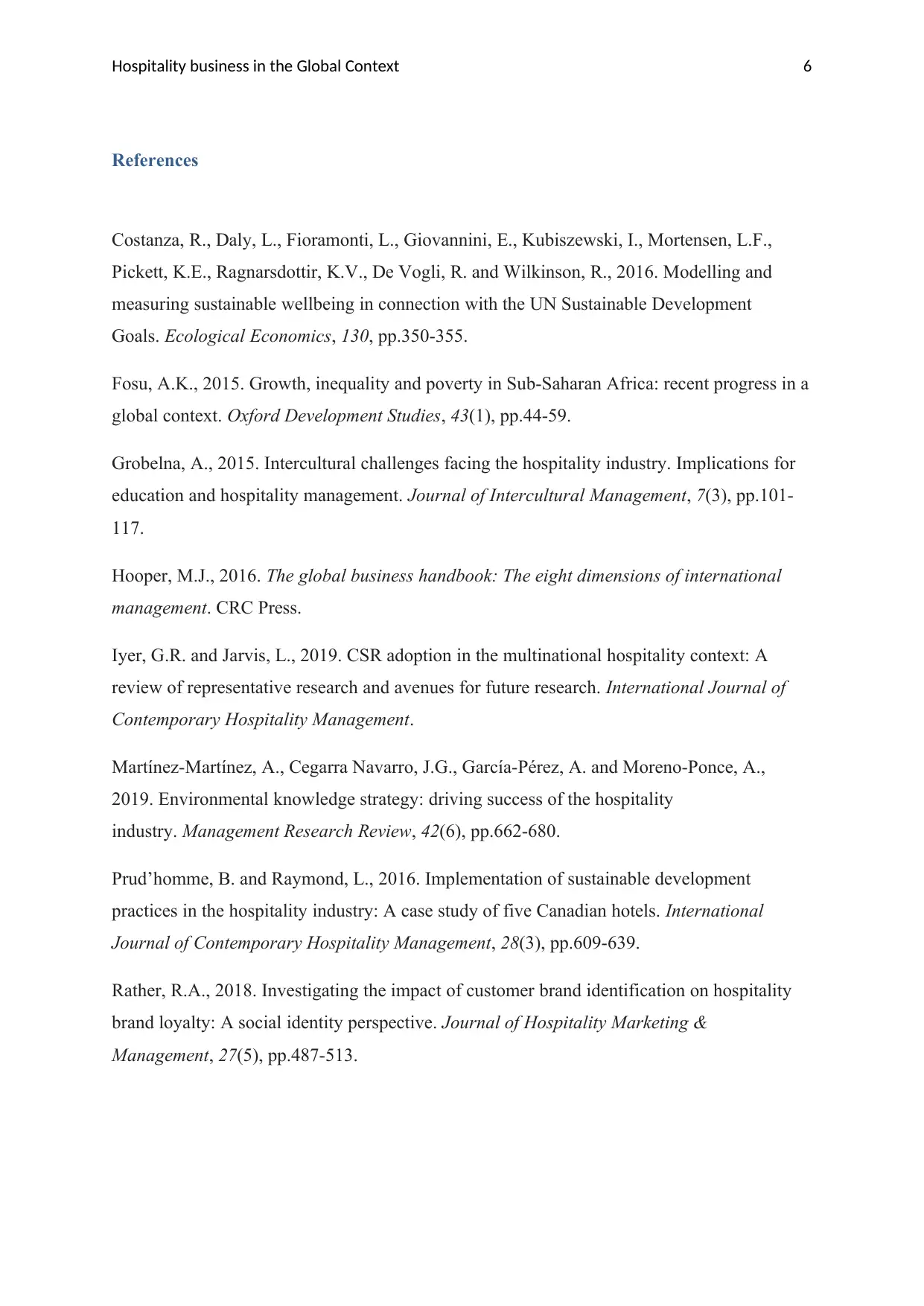
Hospitality business in the Global Context 6
References
Costanza, R., Daly, L., Fioramonti, L., Giovannini, E., Kubiszewski, I., Mortensen, L.F.,
Pickett, K.E., Ragnarsdottir, K.V., De Vogli, R. and Wilkinson, R., 2016. Modelling and
measuring sustainable wellbeing in connection with the UN Sustainable Development
Goals. Ecological Economics, 130, pp.350-355.
Fosu, A.K., 2015. Growth, inequality and poverty in Sub-Saharan Africa: recent progress in a
global context. Oxford Development Studies, 43(1), pp.44-59.
Grobelna, A., 2015. Intercultural challenges facing the hospitality industry. Implications for
education and hospitality management. Journal of Intercultural Management, 7(3), pp.101-
117.
Hooper, M.J., 2016. The global business handbook: The eight dimensions of international
management. CRC Press.
Iyer, G.R. and Jarvis, L., 2019. CSR adoption in the multinational hospitality context: A
review of representative research and avenues for future research. International Journal of
Contemporary Hospitality Management.
Martínez-Martínez, A., Cegarra Navarro, J.G., García-Pérez, A. and Moreno-Ponce, A.,
2019. Environmental knowledge strategy: driving success of the hospitality
industry. Management Research Review, 42(6), pp.662-680.
Prud’homme, B. and Raymond, L., 2016. Implementation of sustainable development
practices in the hospitality industry: A case study of five Canadian hotels. International
Journal of Contemporary Hospitality Management, 28(3), pp.609-639.
Rather, R.A., 2018. Investigating the impact of customer brand identification on hospitality
brand loyalty: A social identity perspective. Journal of Hospitality Marketing &
Management, 27(5), pp.487-513.
References
Costanza, R., Daly, L., Fioramonti, L., Giovannini, E., Kubiszewski, I., Mortensen, L.F.,
Pickett, K.E., Ragnarsdottir, K.V., De Vogli, R. and Wilkinson, R., 2016. Modelling and
measuring sustainable wellbeing in connection with the UN Sustainable Development
Goals. Ecological Economics, 130, pp.350-355.
Fosu, A.K., 2015. Growth, inequality and poverty in Sub-Saharan Africa: recent progress in a
global context. Oxford Development Studies, 43(1), pp.44-59.
Grobelna, A., 2015. Intercultural challenges facing the hospitality industry. Implications for
education and hospitality management. Journal of Intercultural Management, 7(3), pp.101-
117.
Hooper, M.J., 2016. The global business handbook: The eight dimensions of international
management. CRC Press.
Iyer, G.R. and Jarvis, L., 2019. CSR adoption in the multinational hospitality context: A
review of representative research and avenues for future research. International Journal of
Contemporary Hospitality Management.
Martínez-Martínez, A., Cegarra Navarro, J.G., García-Pérez, A. and Moreno-Ponce, A.,
2019. Environmental knowledge strategy: driving success of the hospitality
industry. Management Research Review, 42(6), pp.662-680.
Prud’homme, B. and Raymond, L., 2016. Implementation of sustainable development
practices in the hospitality industry: A case study of five Canadian hotels. International
Journal of Contemporary Hospitality Management, 28(3), pp.609-639.
Rather, R.A., 2018. Investigating the impact of customer brand identification on hospitality
brand loyalty: A social identity perspective. Journal of Hospitality Marketing &
Management, 27(5), pp.487-513.
1 out of 7
Related Documents
Your All-in-One AI-Powered Toolkit for Academic Success.
+13062052269
info@desklib.com
Available 24*7 on WhatsApp / Email
![[object Object]](/_next/static/media/star-bottom.7253800d.svg)
Unlock your academic potential
Copyright © 2020–2026 A2Z Services. All Rights Reserved. Developed and managed by ZUCOL.





